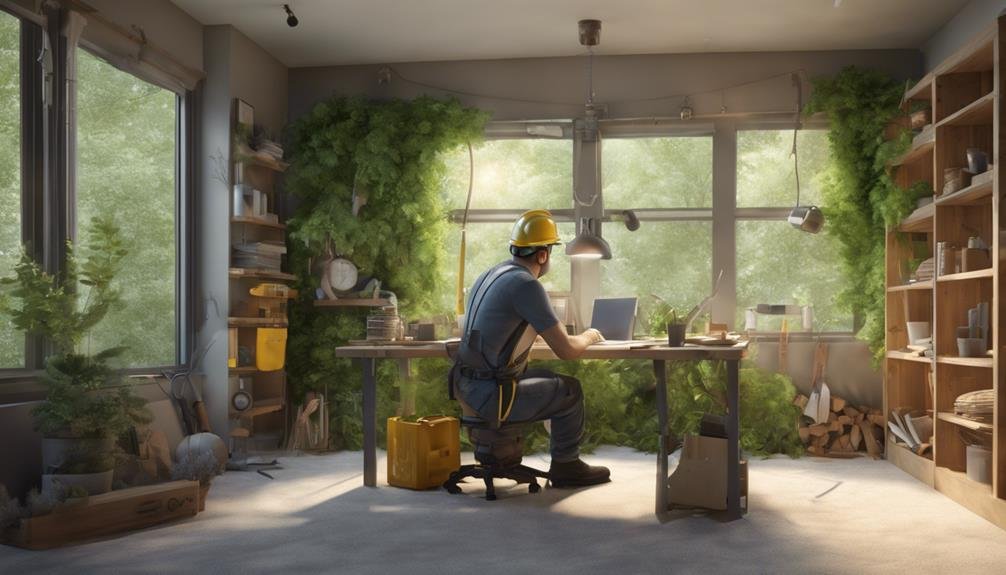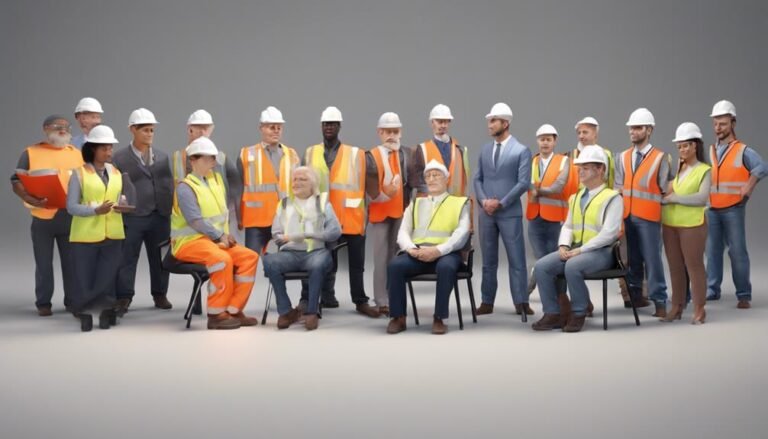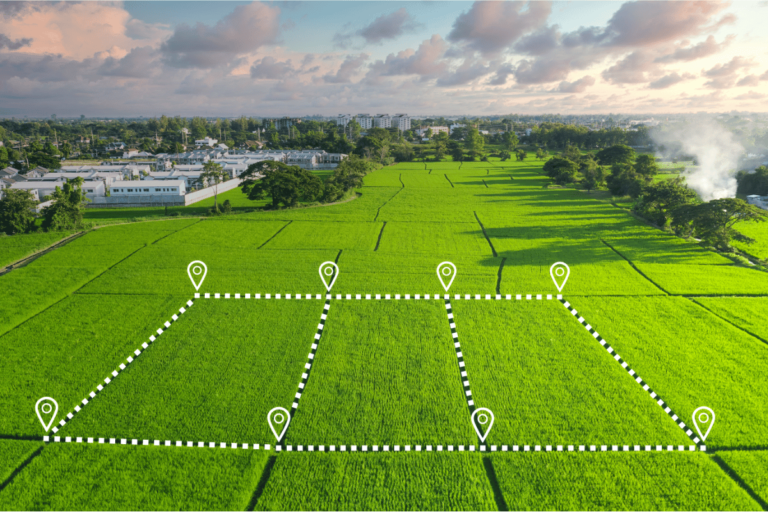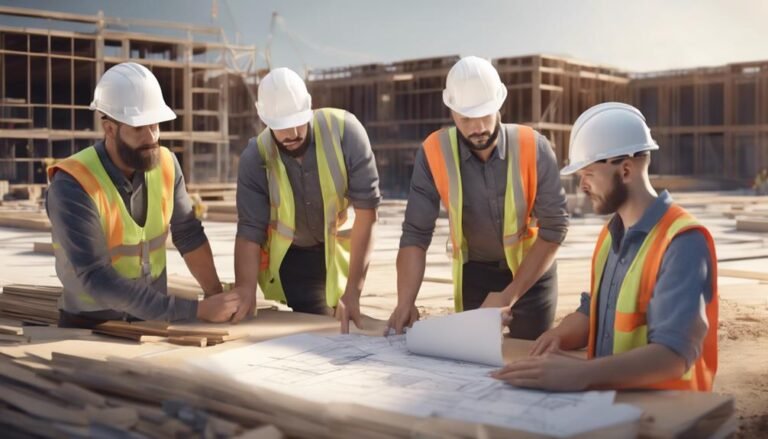Stress Management Techniques for the Construction Workplace
To manage stress in construction, prioritize tasks, delegate effectively, and use time blocking. Practice mindfulness to stay focused and calm. Build strong bonds with colleagues for support and problem-solving. Stay active through group workouts and outdoor activities. Resolve conflicts openly and respectfully. Use stress-relief tools like stress balls and deep breathing. Create a positive workplace with team activities. Encourage work-life balance with flexible schedules. Implementing these techniques optimizes efficiency and well-being in the demanding construction industry.
Key Takeaways
- Practice mindfulness techniques to reduce stress and enhance focus.
- Build strong support networks to boost morale and problem-solving.
- Implement time management strategies for productivity and efficiency.
- Engage in physical exercise to improve health and teamwork.
- Utilize stress-relief tools and techniques for a healthier work environment.
Understanding Construction Stress
Understanding construction stress involves recognizing the unique challenges and pressures faced by workers in this industry. Stress triggers in construction can stem from tight deadlines, safety concerns, long hours, and demanding physical labor. Coping mechanisms are vital to mitigate these stressors.
Common challenges in construction include managing multiple tasks simultaneously, dealing with unexpected delays, and maintaining high safety standards. Solutions to these challenges include effective time management strategies, clear communication among team members, and regular safety training sessions.
Practicing Mindfulness at Work
Focus on your breath and being in the present moment to cultivate mindfulness at work.
By practicing breath awareness, you can anchor yourself in the now, reducing stress and enhancing focus.
This technique can help construction workers navigate challenging situations with more clarity and composure.
Breath Awareness Practice
Implementing a regular breath awareness practice can greatly enhance focus and reduce stress levels for construction workers on site. Breath control involves consciously regulating your breathing patterns, which can have a direct impact on your physical and mental well-being.
Mindful breathing, a key aspect of breath awareness practice, encourages you to pay attention to each breath, fostering a state of relaxation and heightened awareness. Studies have shown that practicing mindful breathing techniques can lower cortisol levels, decrease heart rate, and improve overall cognitive function.
Present Moment Focus
Using mindfulness techniques in your construction work can greatly enhance your ability to stay present and focused amidst the various challenges of the job site. Mindfulness exercises are effective stress reduction techniques that can help you cultivate present moment awareness.
By practicing mindfulness at work, you can improve your concentration, decision-making skills, and overall job performance. Techniques such as mindful breathing, body scans, and sensory awareness can assist you in staying grounded in the present moment, even during high-pressure situations.
Research shows that incorporating mindfulness into your daily routine can lead to reduced stress levels, increased resilience, and improved mental well-being. Incorporating mindfulness practices into your construction work can be a valuable tool for enhancing productivity and managing stress effectively.
Building Strong Support Networks
To effectively manage stress in construction settings, focus on fostering team camaraderie and establishing clear communication channels.
Building strong support networks within your construction team can enhance collaboration, problem-solving, and overall job satisfaction.
Prioritizing these connections can greatly improve workplace dynamics and help alleviate stressors commonly faced in construction environments.
Team Camaraderie
Building strong support networks among construction workers is essential for promoting mental well-being and enhancing overall job satisfaction. Team camaraderie plays a vital role in fostering these networks by encouraging teamwork, communication, and mutual respect.
Team building activities such as group challenges, skills training sessions, and social events can help boost morale and create a sense of unity among workers. When construction teams establish strong camaraderie, they're better equipped to handle stressful situations, collaborate effectively, and support each other through challenging projects.
Research shows that teams with high levels of camaraderie tend to have lower turnover rates and higher productivity levels, highlighting the importance of cultivating a supportive and cohesive work environment in the construction industry.
Communication Channels
Establishing effective communication channels is key to developing strong support networks among construction workers, facilitating collaboration, and enhancing overall job satisfaction. To foster a culture of open communication and team collaboration in the construction workplace, consider the following:
- Regular Team Meetings: Schedule frequent meetings to discuss project updates, address concerns, and brainstorm solutions collectively.
- Digital Platforms: Utilize project management software or communication tools to streamline information sharing and keep everyone in the loop.
- Feedback Mechanisms: Implement feedback sessions to encourage constructive criticism, suggestions, and ideas for improvement among team members.
Effective Time Management Strategies
Implementing consistent time management practices is essential for optimizing productivity and efficiency in construction work. Task prioritization and effective delegation are key strategies for ensuring that important tasks are completed on time. By prioritizing tasks based on deadlines and importance, construction workers can focus on critical activities, reducing stress and improving overall performance. Effective delegation involves assigning tasks to the most suitable team members, leveraging their strengths and skills to maximize efficiency.
Time blocking is another effective time management technique where specific time slots are dedicated to different tasks, helping individuals stay focused and organized throughout the day. The Pomodoro technique, which involves working in focused intervals followed by short breaks, can enhance productivity by maintaining high levels of concentration and preventing burnout.
Incorporating Physical Exercise
To optimize physical well-being and enhance overall performance on construction sites, incorporating regular physical exercise into your routine is imperative. Here are three key ways physical exercise can benefit you on the job:
- Group Workouts: Engaging in group workout sessions can foster camaraderie among coworkers while providing motivation to stay active. Group exercises like circuit training or team sports not only improve physical fitness but also promote teamwork and communication skills essential for a successful construction project.
- Outdoor Activities: Taking part in outdoor activities such as hiking, biking, or running can help you break away from the stress of the job site. Exposure to natural environments has been proven to reduce stress levels and increase feelings of well-being, contributing to a more positive mindset when tackling construction challenges.
- Regular Exercise Routine: Establishing a consistent exercise routine that includes both strength training and cardiovascular activities can enhance your physical endurance and resilience. By dedicating time to exercise regularly, you can improve your overall health and better cope with the physical demands of construction work.
Promoting Healthy Communication Channels
In construction work environments, fostering clear and effective communication channels is vital for ensuring project success and team cohesion. Active listening plays a pivotal role in promoting healthy communication within construction teams. By actively listening to your colleagues, you demonstrate respect and understanding, which can lead to improved collaboration and problem-solving. Engaging in active listening involves giving your full attention to the speaker, acknowledging their points, and providing feedback to promote mutual comprehension.
Conflict resolution is another critical aspect of promoting healthy communication channels in the construction workplace. When conflicts arise, addressing them promptly and constructively can prevent escalation and maintain a positive work environment. Effective conflict resolution techniques include open dialogue, seeking common ground, and finding mutually beneficial solutions. By resolving conflicts in a timely and respectful manner, you can prevent misunderstandings and foster stronger relationships within the team. Prioritizing active listening and conflict resolution strategies can greatly enhance communication effectiveness and overall project outcomes in the construction industry.
Utilizing Stress-Relief Techniques
Utilizing proven stress-relief techniques can greatly enhance the well-being and productivity of construction workers on site. Here are three effective strategies to help manage stress and promote a healthier work environment:
- Stress Relief Tools: Encourage the use of stress relief tools such as stress balls, fidget spinners, or calming essential oils. These tools can provide a quick and easy way to alleviate stress during breaks or downtime on the construction site.
- Mindfulness Techniques: Introduce mindfulness techniques like deep breathing exercises or short meditation sessions. Practicing mindfulness can help construction workers stay focused, reduce anxiety, and improve overall mental well-being, contributing to a more positive work environment.
- Workplace Wellness Programs: Implement workplace wellness programs that include relaxation methods like yoga classes or on-site massages. These initiatives not only offer physical benefits but also help employees unwind, destress, and recharge, ultimately boosting their productivity and job satisfaction.
Creating a Positive Work Environment
Enhancing positivity within the construction work environment can greatly impact worker well-being and productivity. Team bonding plays an essential role in fostering a positive work environment. When team members feel connected and supported, it can lead to increased job satisfaction and collaboration. Encouraging team bonding activities such as group training sessions, team-building exercises, or social events can help strengthen relationships among coworkers.
Workplace culture also plays a vital role in shaping the overall atmosphere within the construction site. A positive workplace culture promotes open communication, respect, and a sense of belonging. By cultivating a culture that values diversity, inclusivity, and feedback, construction companies can create a more supportive environment for their employees. Additionally, recognizing and rewarding employees for their hard work and contributions can boost morale and motivation.
Investing in team bonding initiatives and nurturing a positive workplace culture are essential steps in creating a work environment where employees feel valued, engaged, and motivated to perform at their best. By prioritizing these aspects, construction companies can enhance employee well-being and productivity.
Implementing Work-Life Balance Practices
To promote employee well-being and productivity, construction companies must integrate effective work-life balance practices into their operational strategies. Implementing work-life balance practices can greatly improve job satisfaction and reduce overall stress levels among construction workers.
Here are three key strategies that can help achieve a better work-life balance in the construction industry:
- Flexible Scheduling: Offering flexible work hours allows employees to better manage personal commitments outside of work. This flexibility enables construction workers to attend to family needs, appointments, or personal errands without sacrificing their work responsibilities.
- Remote Work Opportunities: Providing remote work options, when feasible, can give construction workers the flexibility to work from home or other locations. This can be especially beneficial during times when physical presence on-site isn't mandatory, allowing employees to better balance work and personal life.
- Wellness Programs: Implementing wellness programs that focus on physical health, mental well-being, and stress management can support construction workers in maintaining a healthy work-life balance. These programs can include fitness classes, counseling services, and mindfulness workshops to help employees cope with job demands effectively.
Conclusion
To sum up, managing stress in the construction workplace is essential for maintaining productivity and well-being. By incorporating mindfulness, building support networks, and practicing effective time management, you can create a positive work environment and promote work-life balance.
Remember, implementing these techniques may not make stress disappear completely, but they can certainly help you feel like you're carrying a feather instead of a ton of bricks. So go ahead, take the first step towards a healthier and happier work life!







